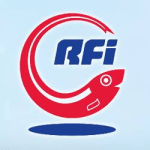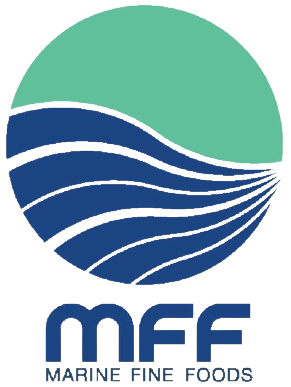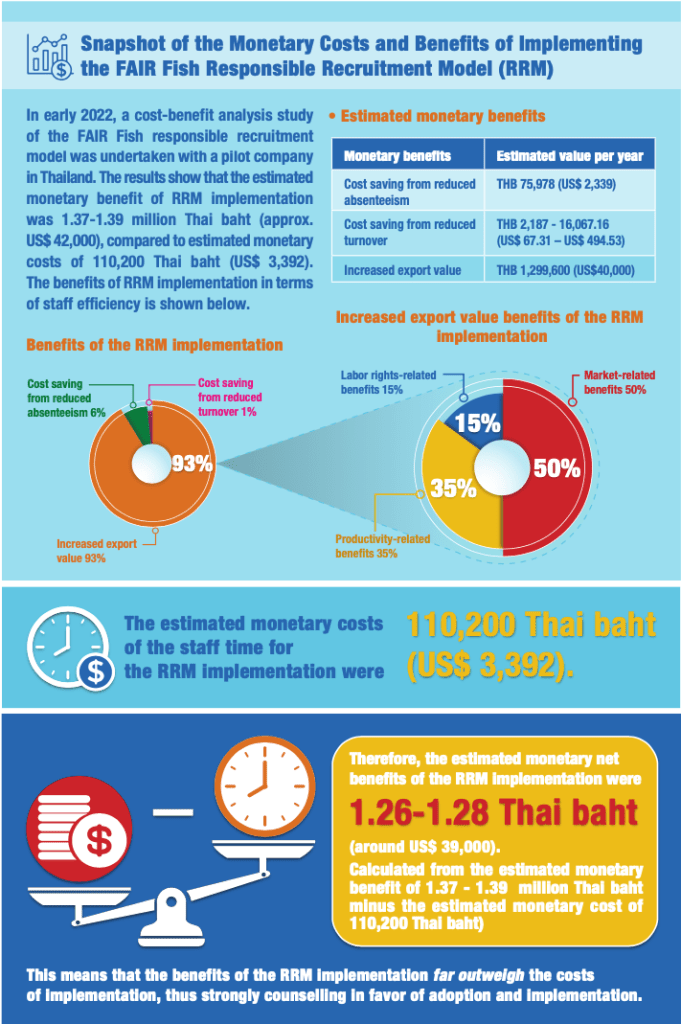Raising Labour Standards for Seafood Companies
Piloting the FAIR Fish Responsible Recruitment Model
Plan International partnered with two pilot companies to implement the Responsible Recruitment Model. Over the course of seven months, the pilot companies worked with Plan International to make changes to the company’s internal policies and practices.
Through the partnership, the two pilot companies were capacitated to implement their policies and procedures that have been aligned with international standards for responsible recruitment, and adopted specific policies and plans to combat child labor, forced labor, trafficking in persons, and other violations of workers’ rights
Technical Assistance sessions provided to the pilot companies
Recruitment-related policies and procedures of pilot companies revised and/or developed
RRM leads to improvement in recruitment policies
- Workers contracts are translated into their native language
- Employers pay recruitment fees, visa fees, document processing fees and work permit fees
- Employers establish a formal communication mechanism with Thai recruitment agents
- Employers collect receipts for any costs from Thai recruitment agents
- Companies upgrade or subsidize worker transportation pre-arrival to factory
- Companies upgrade or subsidize worker accommodation in Thailand
- Companies hire translators and interpreters for migrant workers
- Companies fund or subsidize Pre-Departure Training or Post-Arrival Training
- Adapt recruitment policies to give special consideration for women workers
VIDEO: Companies
Pilot Company Profile

Rayong Fish Sauce Industry Co. Ltd.
RFI is located in Rayong province, Thailand where it is the third-largest producer of fish sauce in the country. The company employs 150 people, with 104 Thai, 5 Myanmar, ana 41 Cambodian nationals. It produces around 1.4 million liters of fish sauce per year, with 30 percent exported to Asia, the European Union, and the US. Seventy percent of their production is sold in the Thai domestic market.

Marine Fine Foods Co. Ltd.
MFF Marine Fine Foods Co., Ltd. was established in 1994, and is a producer of dried anchovy, chirimen and dried pangasius products.MFF mostly produces fresh fish raw materials which are sold and processed downstream into ready-to-eat fish products, many of which are exported to foreign countries. Recently, MFF has developed ready-made products for sale in Thailand as well. Located in Rayong, on Thailand’s eastern seaboard, the company employs over 50 workers, including a small number of migrant workers.
The Business Case for Responsible Recruitment
Following implementation of the Responsible Recruitment Model, a thorough assessment was conducted by research consultancy, Rapid Asia. A number of positive impacts at the company were found following the adoption of the RRM.
Benefits to Migrant Workers
- Enhanced stability
- Better access to benefits and entitlements
- Legal protection for workers
- Strengthened labor rights for workers
- Strengthened grievance mechanisms and remediation.
Benefits to Employers
|
Number of industry recipients of the business case report
Cost-benefit analysis found:
- Total estimated benefits of RRM adoption were 1.37-1.39 million Thai baht (US$ 42,000).
- Total estimated costs of RRM adoption were 0.11 million Thai baht (US$ 3,400).
- Total estimated monetary benefit of RRM adoption was 1.26-1.28 million Thai baht (US$ 39,000).
Costs savings
- Direct cost savings from the reduction in employee absenteeism was THB 75,978 (US$ 2,339) per year.
- Indirect cost savings from reduced turnover was between THB 2,187 (US$ 67) and THB 16,067 (US$ 495) per year.
- In total, the reduced cost savings of RRM implementation are estimated to be between THB 78,165 (US$ 2,406) and THB 92,045 (US$ 2,883) per year.
Opening up New Markets and Increased Export Value
- Total estimated sales to be secured in case of the company being able to receive BSCI in the future would be around US$ 400,000 or 12,996,000 Thai baht.
The contribution of the RRM to securing the BSCI and thus ensuring these sales was estimated to be 10 percent, or 1,299,600 Thai baht (US$40,000).
